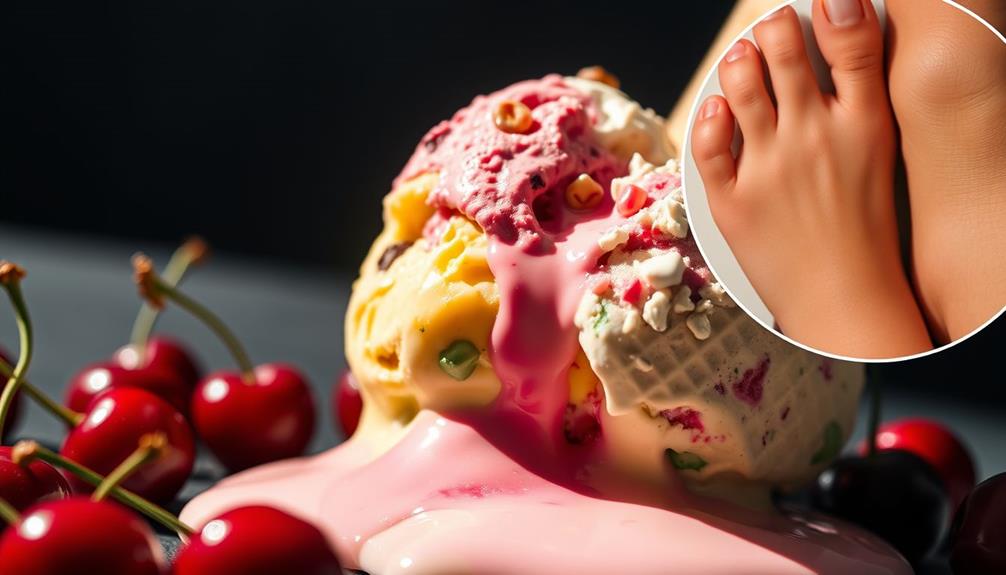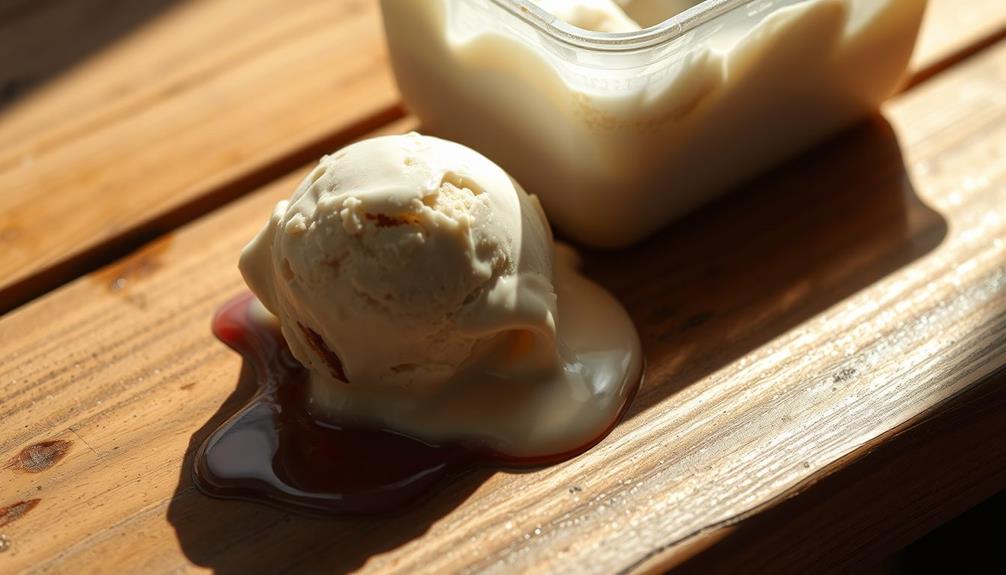You can enjoy ice cream during pregnancy, but you should opt for varieties made from pasteurized milk and eggs to avoid health risks like listeriosis and salmonella. Store-bought ice cream is generally safe, while homemade kinds that use raw eggs can pose significant dangers. It's best to indulge in moderation, as excessive sugar can lead to gestational diabetes. Also, be mindful of caffeine in certain flavors, and choose brands known for high hygiene standards. Your cravings for ice cream are completely normal, and you might find a few helpful guidelines to keep in mind as you navigate this delicious treat.
Key Takeaways
- Yes, you can eat ice cream while pregnant, but choose varieties made from pasteurized milk and eggs to reduce foodborne illness risks.
- Moderation is important; limit sugar and calorie intake to avoid complications like gestational diabetes.
- Be cautious with caffeine-containing flavors, aiming for a maximum of 200 mg of caffeine daily as recommended by ACOG.
- Store-bought ice cream is generally safer than homemade versions, which may contain raw eggs.
- Always consult your healthcare provider for personalized dietary guidance during pregnancy.
Ice Cream Safety Guidelines
When you're pregnant, it's important to keep safety in mind while indulging in ice cream. You can enjoy this tasty treat by following some simple ice cream safety guidelines.
First, always choose ice cream made from pasteurized milk and eggs. This reduces your risk of listeriosis and salmonella, which can be harmful during pregnancy. Store-bought varieties are usually safe, but be cautious with homemade ice cream that contains raw eggs. Those can pose a significant risk of salmonella contamination.
Additionally, maintaining a healthy diet during pregnancy is essential, so make certain that your overall nutrition includes safe second trimester workouts for pregnancy that support your well-being.
While enjoying ice cream, remember to limit your intake of caffeine-containing flavors. The American College of Obstetricians and Gynecologists (ACOG) recommends a maximum of 200 mg of caffeine daily, so check the labels before you indulge.
Moderation is key; consuming too much sugar can lead to gestational diabetes, so keep your portions reasonable.
Lastly, always opt for ice cream brands that maintain high hygiene standards. This extra care guarantees that you're prioritizing both your health and your baby's.
Understanding Pregnancy Cravings

Throughout pregnancy, many women experience intense cravings, which can be both surprising and delightful. These pregnancy cravings often start by the end of the first trimester and peak during the second trimester, affecting about 50-90% of pregnant women in the U.S.
If you find yourself longing for ice cream during pregnancy, you're not alone; around 12% of pregnant women specifically crave this creamy treat, often because of pre-existing preferences for dairy. It's important to maintain a balance in your diet, as proper nutrition plays a vital role in overall health during pregnancy, including menopause management for those experiencing symptoms.
Hormonal changes play a significant role in intensifying these cravings, making foods like ice cream even more appealing. However, it's essential to approach these cravings mindfully.
While indulging every now and then is perfectly fine, moderation is key. Overindulging in high-calorie treats, including ice cream, could lead to complications such as gestational diabetes, which can affect both you and your baby.
As you get closer to your delivery date, you might notice that your cravings begin to decline. By being aware of your cravings and managing them wisely, you can enjoy your pregnancy while also prioritizing your health and your baby's well-being.
Nutritional Considerations

Balancing your cravings with nutritional needs is essential during pregnancy, especially when it comes to indulging in ice cream. While ice cream can provide a source of calcium, which is vital for you and your developing baby, it shouldn't be your primary source. The ACOG recommends a daily intake of 1,000 mg of calcium, and there are healthier ways to meet this requirement.
In addition, incorporating a variety of cleaning service options can help maintain a hygienic environment for you and your baby, which is equally important during this period.
A pint of ice cream can pack over 1,000 calories, emphasizing the importance of portion control to prevent excessive weight gain. Gaining too much weight during pregnancy can increase your risk of conditions like gestational diabetes.
Furthermore, even though cravings for ice cream are common, moderation is key. Enjoying small servings can help you avoid spikes in blood sugar levels that could lead to complications.
Commercially produced ice creams are generally safe to consume since they use pasteurized ingredients. However, be cautious with homemade varieties that may contain raw eggs.
Aim for a balanced diet rich in nutrient-dense foods, treating ice cream as an occasional delight rather than a dietary staple. This way, you can satisfy your cravings while still prioritizing your health and that of your baby.
Recommended Foods During Pregnancy

A well-rounded diet is vital during pregnancy, as it supports both your health and your baby's development. To guarantee you're meeting your nutritional needs, focus on incorporating a variety of foods that provide essential vitamins and minerals.
Here's a quick guide to recommended foods during pregnancy:
| Food Group | Benefits |
|---|---|
| Leafy Greens | Rich in folate, iron, calcium, and vitamins |
| Lean Proteins | Supplies amino acids and B vitamins |
| Whole Grains | High in fiber, maintains energy and digestion |
| Fruits & Vegetables | Packed with vitamins, fiber, and antioxidants |
| Dairy Products | Provides calcium and vitamin D, critical for bones |
While it's important to embrace nutritious foods, be mindful of certain foods to avoid, such as raw seafood or unpasteurized dairy products. These can pose risks during pregnancy. By choosing the right foods, you'll support your baby's growth and your overall well-being. Embrace a diverse diet, and remember that moderation is key, especially with dairy products, to avoid excess sugars.
Consult Your Healthcare Provider

Maintaining a nutritious diet during pregnancy is important, but it's equally essential to consult your healthcare provider about your dietary choices, including treats like ice cream. Your healthcare provider can help you understand your specific dietary needs and any concerns regarding food safety.
They can guide you on what's safe to eat, guaranteeing that your cravings for ice cream don't negatively impact your health or your baby's.
Regular check-ins with your healthcare provider are vital for monitoring weight gain and evaluating the risk of gestational diabetes. This condition can be influenced by your diet, including the types and amounts of ice cream you consume.
Your provider can also recommend safe brands that use pasteurized ingredients, greatly reducing the risk of foodborne illnesses.
Open communication with your healthcare provider allows you to discuss any specific health conditions or dietary restrictions that might affect your enjoyment of ice cream.
By consulting them, you can enjoy your favorite treats while staying within the recommended caloric intake for each trimester.
Prioritizing this dialogue guarantees that you make informed choices that benefit both you and your developing baby.
Frequently Asked Questions
Is It Safe to Eat Ice Cream During Pregnancy?
Eating ice cream during pregnancy can be safe if it's made from pasteurized ingredients. Just make sure to choose store-bought options, limit caffeine flavors, and enjoy it in moderation to maintain a balanced diet. Additionally, it’s important to be mindful of the sugar content in ice cream as excessive sugar intake can lead to issues such as gestational diabetes. As for the question, “Can dogs have ice cream,” it’s best to avoid giving your canine companion this sweet treat as it can cause digestive issues and potential harm due to the ingredients like chocolate, which is toxic to dogs. Instead, opt for dog-friendly frozen treats or fresh fruits as a safer alternative.
What Is the Best Ice Cream to Eat While Pregnant?
When choosing ice cream, opt for brands that use pasteurized ingredients, like Ben & Jerry's. Look for lower sugar options and consider non-dairy alternatives to satisfy cravings while maintaining a balanced diet during pregnancy.
Can Pregnant People Have Soft Serve Ice Cream?
You might worry about safety, but if you choose soft-serve from reputable places using pasteurized ingredients, it's generally safe. Just enjoy in moderation and watch for caffeine or alcohol in flavors.
Can You Eat Mcdonald's Ice Cream Pregnant?
You can enjoy McDonald's ice cream while pregnant, as it's made with pasteurized ingredients. Just be mindful of portion sizes and limit caffeine. Remember, moderation's key to maintaining a balanced diet during this time.
Conclusion
So, go ahead and indulge in that creamy, dreamy ice cream while you're pregnant! Picture yourself savoring a scoop of chocolate fudge swirl, feeling like you're on a blissful cloud of happiness. Sure, keep an eye on the safety guidelines and balance it with nutritious foods, but don't let guilt creep in! You deserve a little sweetness during this extraordinary journey. Treat yourself—you're growing a tiny human, and ice cream is practically a superfood!









